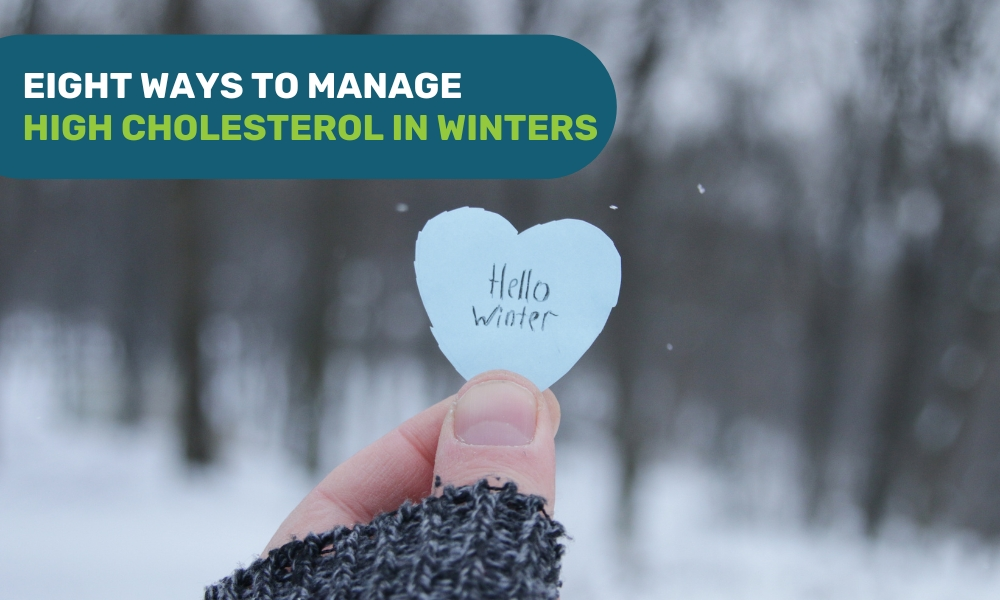High cholesterol is hazardous for our heart health. It can become more troublesome during the winter months and cast an increased risk of heart disease and heart attack.
High cholesterol refers to the build-up of a wax-like substance in our arteries that obstructs the normal functioning of the heart, causing heart problems and other health issues.
However, with an increasingly sedentary lifestyle, it has now become a common health problem. There are no overt symptoms of high cholesterol; therefore, it becomes even more dangerous.
Further, winters can be a challenging time for people with high cholesterol. Winters are all warm and cozy, but it also entails health ailments like a spike in bad cholesterol, diabetes, high blood pressure, etc., which is unhealthy for the heart’s well-being.
Cholesterol is generally categorized into two sub-categories – Good Cholesterol and Bad Cholesterol. High-density lipoprotein (HDL) is the “good cholesterol.” It usually transports excess cholesterol from our arteries to our liver, which removes it from our body. Low-density lipoprotein (LDL) is the “bad and unhealthy cholesterol. LDL cholesterol builds up in our arteries and forms fatty, waxy deposits called plaques.
Why dose bad cholesterol increase in winters?
The cold weather in the winter season may cause some changes in our lifestyle, such as:
-
Increased intake of unhealthy foods
-
Reduced physical activity
-
Changes in medication absorption
-
Slow Metabolism
These factors can elevate cholesterol levels and increase the risk of cardiovascular complications.
Also, the risk of heart health increases during this time. To begin with, reduced temperatures cause constriction of the blood vessels, which could increase blood pressure. The raised pressure stresses the heart and may cause a heart attack in people who already have a weak cardiac system.
Tips to reduce LDL level
1. Stay Hydrated: We generally do not feel thirsty in winter But, consuming plenty of water and fluids is vital for overall health and helps regulate blood pressure and cholesterol levels. One must aim to drink at least eight glasses of water per day even if we do not get thirsty.
2. Maintain a Healthy Diet: Focus on whole, unprocessed foods. Choose whole grains, fruits, vegetables, lean protein, and healthy fats like olive oil and avocado. These foods are high in fiber and nutrition, which can help lower cholesterol levels.
3. Limit saturated and trans fats: These unhealthy fats can raise cholesterol levels. One must avoid processed meats, fried foods, and sugary drinks. Include cholesterol-lowering foods like oats, barley, beans, and nuts containing soluble fiber, which helps bind the cholesterol and removes it from the body.
4. Get Enough Vitamin D: Vitamin D plays an important role in cardiovascular health. During winter, when sunlight is limited, it’s important to get enough vitamin D from supplements or fortified foods like milk and cereal.
5. Limit Alcohol Consumption: Alcohol can raise cholesterol levels. One must limit the alcohol intake and opt for other nutritious beverages.
6. Stay Active: Regular physical activity is essential for managing high cholesterol. One must aim for at least 30 minutes of moderate-intensity exercise daily. One can even do the workout in shorter chunks throughout the day.
7. Sleep enough: Aim for 7-8 hours each night. Insufficient sleep can increase our stress levels, and we may experience mood swings and poor health. Due to this, we may start making unhealthy food choices, which can impact our cholesterol levels negatively.
These lifestyle changes can help reduce the high cholesterol symptoms and protect the heart from further cardiac problems. However, it is imperative to mention that regular visit to cardiologist is must for people with existing heart issues. Further, one must also undertake regular cardiac checks especially in case of existing heart-related issues.
One can keep a tab on their cholesterol levels by availing following services at LivLong.
-
Lipid panel Blood test every 6 months.
-
GP Teleconsultation for your lab reports review.
-
Cardiologist Teleconsultation for your lab reports review.
-
Nutritionist Teleconsultation and customized diet plan.
With these tips and lifestyle changes keep yourself warm and enjoy a healthy winter!



